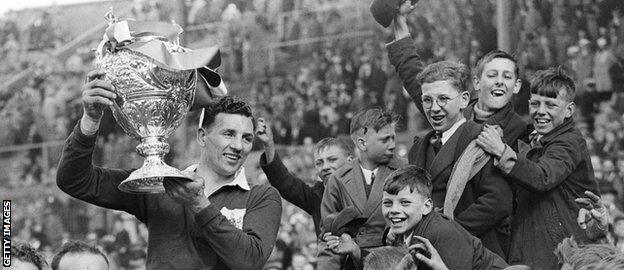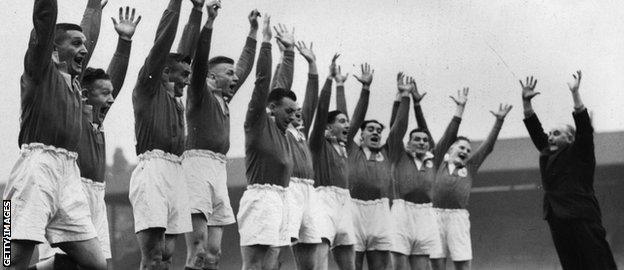Lance Todd: Who was the man whose name adorns the Challenge Cup final's man of the match award?
- Published
Challenge Cup Final - highlights
Challenge Cup Classics |
|---|
Date: Sunday, 10 May Time: 14:05 BST Coverage: Watch on BBC One, catch up on BBC iPlayer |
"I don't even know who Lance Todd is to be honest."
Those were the words of Wigan prop Jeff Lima, a wrecking-ball front-rower from New Zealand, having won man of the match - the trophy that bares Todd's name - at the 2011 Challenge Cup final.
It was perhaps a throwaway line from a fatigued player at the end of a sapping and emotional game, which you can see in Sunday's Challenge Cup Classics show on BBC One (14:05 BST).
But it also showed that a generation did not recognise New Zealander Todd's achievements and significance in establishing rugby league as a player, manager and media personality.
'Small, dapper and immaculate'
Todd's influence can be felt in the words of former Wales international Gus Risman in his book 'Rugby Renegade', describing the Kiwi as "the brains" behind the magnificent Salford side of the 1930s.
The word 'renegade' was intended to describe the sometimes outspoken Risman, but he shared those cavalier, visionary traits with his mentor.
Rugby league historian Mike Latham has spent many years researching Todd's story.
"He was a visionary amongst other things and pioneer for rugby league in general," Latham told BBC Sport. "He was a man of many parts, a remarkable man, he trained as a master tailor in New Zealand.
"Todd was a small dapper man, 5ft 7ins (170cm), 10 stone (63.5kg) and immaculately attired. He always wore a suit, with waistcoat and watch chain. His hair was always immaculate."

Gus Risman saw Lance Todd as the key figure behind Salford's 1930s successes
Dashing, quick and shrewd
Already a rugby union player of repute, Todd arrived in England as part of the 1907 New Zealand All Golds touring party, having helped recruit other star players for the first professional tour with Albert Baskerville.
He received a lifetime ban from the New Zealand RU but in turn found himself recruited by Wigan after a stellar tour for £400 - a huge sum in those days when the average wage in Wigan was £2.
The centre was as stylish on the field as he was off it, while his sprinting past gave him a devastating turn of speed.
"He was the idol of the Wigan crowd," Latham added. "He was like the Indian rubber man, bouncing up out of tackles, so fast and had an incredible eye for an opening and for a pass.
"As part of his signing he arranged for Wigan to pay his indentures to finish off his master tailoring, and they sent him to Savile Row in London.
"He opened a restaurant, he was a scratch golfer, and he was a thespian - he'd played parts at Wigan Little Theatre.
"When Wigan won the Lancashire Cup in 1908, they had a celebration dinner at Central Park after the game on the Saturday, but Lance was unable to go to the dinner because he was playing the lead in a play."
He eventually left Wigan for Dewsbury in 1914, but the start of World War One would call time on his playing career.
'The greatest manager'
Todd, like many sportsmen of all codes, swapped the playing field for the battlefields of Europe.
He enrolled as an officer, "a rarity for a rugby player" Latham explained, and in addition to being promoted to captain, also won medals for bravery and was mentioned in dispatches at Gallipoli.
On his return to England as a Kiwi war hero, golf became his life as professional and secretary at South Shore Golf Club, in Blackpool, until a newspaper advert caught his eye.
He took over at Salford in 1928, and would change their fortunes considerably.
"Within a year they went from 26th in the league to fourth," historian Latham said. "In his time at the Willows, Salford won the Lancashire Cup four times, were league champions three times, and won the Challenge Cup at Wembley when they beat Barrow."

Lance Todd (right) guided Salford to a glut of trophies
Among the players brought to Salford were half-back Emlyn Jenkins, winger Barney Hudson and full-back Risman, who described 'Toddy' as the "greatest manager of all time".
"Wherever or whenever people discuss rugby league, the name of Lance Todd must crop up in the conversation," Risman wrote in his 'Rugby Renegades' book, in a chapter entitled 'Mr Rugby League'.
"Lance Todd could never stand mediocrity," he wrote. "Only first class players would do for him, and consequently the Salford public was treated to such a feast of rugby."
His pioneering spirit also took Salford to France in 1934, where they were christened 'Les Diables Rouges' - the Red Devils - a nickname which still stands today.
In between all of that, he was also the voice of BBC rugby league broadcasts, and wrote a newspaper column.
Salford's victory over Castleford in the 1939 Championship final would be his last meaningful act in the coaching role, as war again rolled in and in 1940 the club was forced to let him go.
Tragic end, huge legacy
Too old for regular service, Todd joined the Home Guard during World War Two, serving the north west region he made his home, but his life was sadly cut short at the age of 58, when he died on 14 November 1942 in a car crash.
"He had an amazing funeral, thousands of people came and lined the streets," Latham added.
"As the funeral cortege proceeded to Wigan cemetery, there were a huge amount of people there. They played 'The Last Post', the army fired volleys into the air. It was like a state funeral, really."
It was decided to name the man of the match award at the Challenge Cup final after Todd on the post-war resumption of sport in 1946, thanks to the work of Australian journalist Harry Sunderland, Warrington director Bob Anderton and Yorkshire Evening Post journalist John B. Bapty.
The forming of the Red Devils Association, who still look after the trophy and host the dinner in the honour of the winner, helped raise the funds for the trophy and replicas going forward.
Each year a new winner is crowned, keeping the spirit of the pioneering Todd in the conscious of rugby league fans around the world.